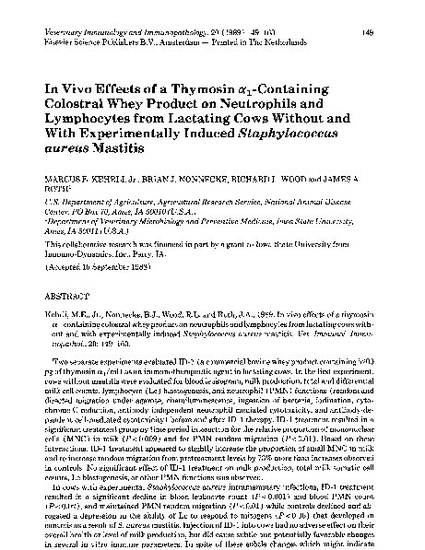
Article
In Vivo Effects of a Thymosin a1-Containing Colostral Whey Product on N eutrophils and Lymphocytes from Lactating Cows Without and With Experimentally Induced Staphylococcus aureus Mastitis
Veterinary Immunology and Immunopathology
Document Type
Article
Disciplines
Publication Version
Published Version
Publication Date
1-1-1989
DOI
10.1016/0165-2427(89)90095-0
Abstract
Two separate experiments evaluated ID-1 (a commercial bovine whey product containing 5200 pg of thymosin α1/ml) as an immunotherapeutic agent in lactating cows. In the first experiment, cows without mastitis were evaluated for blood leukogram, milk production, total and differential milk cell counts, lymphocyte (Lc) blastogenesis, and neutrophil (PMN) functions (random and directed migration under agarose, chemiluminescence, ingestion of bacteria, iodination, cytochrome C reduction, antibody-independent neutrophil-mediated cytotoxicity, and antibody-dependent cell-mediated cytotoxicity) before and after ID-1 therapy. ID-1 treatment resulted in a significant treatment group by time period interaction for the relative proportion of mononuclear cells (MNC) in milk (P<0.009) and for PMN random migration (P<0.01). Based on these interactions, ID-1 treatment appeared to slightly increase the proportion of small MNC in milk and to increase random migration from pretreatment levels by 73% more than increases observed in controls. No significant effect of ID-1 treatment on milk production, total milk somatic cell counts, Lc blastogenesis, or other PMN functions was observed. In cows with experimental Staphylococcus aureus intramammary infections, ID-1 treatment resulted in a significant decline in blood leukocyte count (P<0.001) and blood PMN count (P<0.02), and maintained PMN random migration (P<0.01) while controls declined and abrogated a depression in the ability of Lc to respond to mitogens (P<0.05) that developed in controls as a result of S. aureus mastitis. Injection of ID-1 into cows had no adverse effect on their overall health or level of milk production, but did cause subtle and potentially favorable changes in several in vitro immune parameters. In spite of these subtle changes which might indicate increased resistance to mastitis, cows actually developed a more severe S. aureus intramammary infection based on a 9% increase in log10 bacterial shedding in milk.
Rights
Works produced by employees of the U.S. Government as part of their official duties are not copyrighted within the U.S. The content of this document is not copyrighted.
Language
en
File Format
application/pdf
Citation Information
Marcus E. Kehrli, Brian J. Nonnecke, Richard L. Wood and James A. Roth. "In Vivo Effects of a Thymosin a1-Containing Colostral Whey Product on N eutrophils and Lymphocytes from Lactating Cows Without and With Experimentally Induced Staphylococcus aureus Mastitis" Veterinary Immunology and Immunopathology Vol. 20 Iss. 2 (1989) p. 149 - 163 Available at: http://works.bepress.com/james_roth/16/

This article is from Veterinary Immunology and Immunopathology 20 (1989): 149, doi:10.1016/0165-2427(89)90095-0.